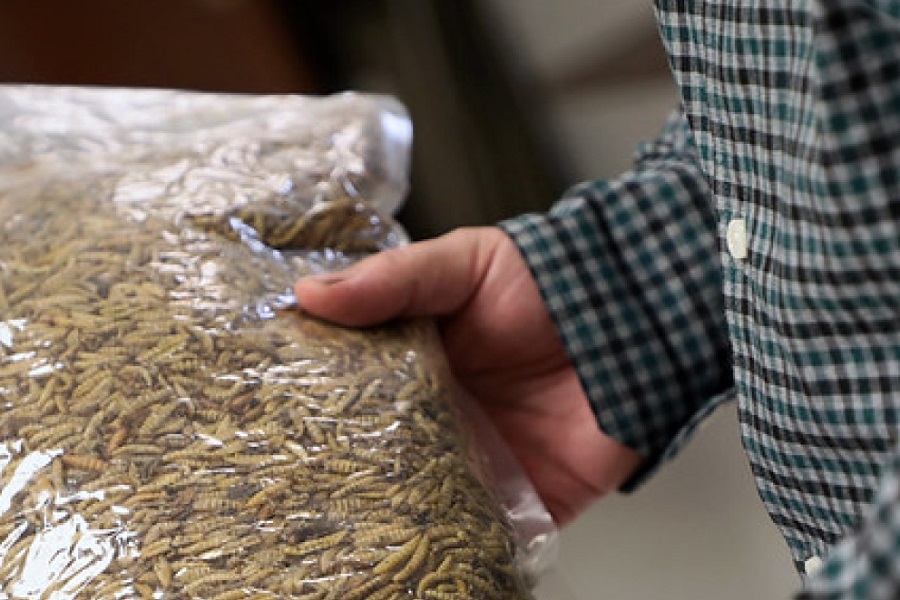2024-11-29 22:11:24
As the world grapples with the adverse effects of climate change, there is an urgent need to divert organic waste from landfills.

Waste emissions contribute at least 3% to global greenhouse gas emissions, with organic waste in landfills responsible for 20% of global methane emissions.
The UNEP-convened Climate and Clean Air Coalition’s Technology and Economic Assessment Panel (CCAC-TEAP) has identified two underfinanced yet highly effective solutions to reduce the emissions impact of organic waste: Black Soldier Fly (BSF) technology and biocovers.
Read the full CCAC-TEAP’s Working Brief Scaling Up Underfinanced SLCP Mitigation Solutions: Driving Innovation and Technology in the Waste Sector here.
Black Soldier Fly (BSF) Technology
How it Works: BSF technology leverages the natural reproduction cycle of black soldier flies, which aids in the decomposition and nutrient recycling of organic material. In controlled environments, larvae are harvested before reaching the pre-pupae stage, providing valuable by-products such as protein for animal feed and insect oil.
Mitigation Potential: Studies indicate that BSF technology can significantly reduce greenhouse gas emissions compared to traditional composting processes. The adaptability of BSF plants makes them suitable for diverse contexts, from small-scale household solutions to large-scale industrial plants.
Job Potential: BSF technology offers formal employment opportunities for both skilled and unskilled workers. Decentralized plants can empower unskilled workers to own, operate, and maintain these facilities.
Business Case: Beyond waste reduction, BSF technology yields high-quality products with global demand, including pet and poultry food, insect oil, biofuel, and compost. Ongoing projects, such as the CCAC-supported site in Lima, Peru, aim to demonstrate the business viability of BSF plants for large-scale organic waste treatment.
Biocovers
How They Work: Biocovers are locally engineered systems that use combinations of organic materials to cover landfill surfaces. Acting as biofilters, they disperse methane and oxidize organic waste, significantly reducing greenhouse gas emissions.
Mitigation Potential: Biocovers have demonstrated high mitigation potential in various landfill contexts globally. While effectiveness depends on factors like soil type, moisture content, and organic material density, biocovers are generally low-maintenance, require limited technology, and allow adaptation over time.
Business Case: While costs vary, biocovers are considered highly cost-effective solutions, especially if local compost is available. They can also be a potential source of finance through carbon credits and sectoral investments.
Building a Circular Economy
The CCAC Technology and Economic Assessment Panel (CCAC-TEAP) emphasizes the shift toward a circular economy, where organic waste becomes an adaptation and mitigation resource. Managing organic waste through separation, composting, and valorization mitigates methane generation while generating resources. The use of black soldier fly larvae and compost or digestate in various applications contributes to emission reduction, climate adaptation, and job creation, while biocovers encourage production of compost as an effective mitigation material.
Read the CCAC-TEAP’s Working Brief Scaling Up Underfinanced SLCP Mitigation Solutions: Driving Innovation and Technology in the Waste Sector
About CCAC Technology and Economic Assessment Panel (CCAC-TEAP)
The CCAC-TEAP is co-chaired by Ireland and Senegal, and responds to demand from countries by providing targeted guidance on super-pollutant mitigation. Focusing on scalable methane reduction technologies, CCAC-TEAP aims to bridge existing gaps, complementing broader strategies with specific, investable options.
The CCAC-TEAP seeks to bolster the implementation of national methane action plans. By engaging the private sector, facilitating access to international financial institutions, and presenting successful case studies, CCAC-TEAP aims to be a driving force in the Global Methane Pledge.
Engage with CCAC-TEAP
The CCAC-TEAP invites interested partners to share knowledge and advocate for increased financing and deployment of these transformative technologies, contributing to a sustainable future.
Most Viewed

Elephants, Giant Harmless Animals
2024-11-29 22:11:23

Commercial whaling and climate change are inhibiting evolutionary change in Arctic whales
2024-11-29 22:11:24

World Environment Day: 5th June
2024-11-29 22:11:24

Talking About Earth Day at Havre de Grace Maritime Museum
2024-11-29 22:11:24

Lithium: Global Projects and Policies of Economic Powers
2024-11-29 22:11:24
Comment

Why we need a UN Treaty on plastic pollution The Ellen MacArthur Foundation is a UK charity working on business, learning, insights & analysis, and communications to accelerate the transition towards the circular economy.

Air Pollution for Kids Air is all around us and we need it to survive.

Why We Need to Stop Plastic Pollution? Our oceans are being filled and killed by throwaway plastics.

Climate Change, Ecological Crisis and Sustainability We are all agents for change in climate action.

Climate Racism Climate Racism: Social Inequalities in the Age of Climate Change
Brigitte Colman
2024-11-30
J'ai lu votre article, c'est très intérressant de voir cette union. Le protocole de Montréal nous a montré cette union pour la lutte contre une crise mondiale.
Antoin Perrin
2024-11-30
La couche d'ozone garantie notre santé et la continuation de la vie de tous les êtres vivants de la terre.